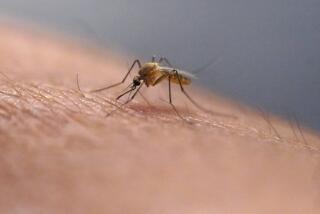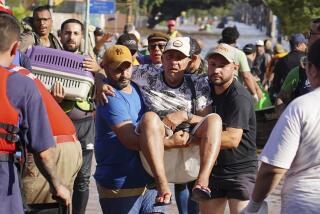Brazilians Battle Dengue Outbreak
- Share via
RIO DE JANEIRO — At least 23 people have died and tens of thousands have become ill in the worst outbreak of dengue fever in Rio de Janeiro in a decade. The epidemic is slowly spreading to other Brazilian cities and has even infected the nation’s presidential race.
Heavy rains and layoffs in Rio’s dengue prevention program have helped spread the mosquito-borne illness, which had been wiped out in Brazil just a generation ago. By last summer, dengue was in nearly every corner of Rio, from its poor favelas to chi-chi beach communities.
“We are in a state of emergency,” said Flavio Souza, a doctor at Lourenco Jorge Municipal Hospital, where dengue patients have formed long lines outside the emergency room.
“It’s so painful, your head seems to explode,” Francisco do Nacimento said as he waited in line. Three other members of Nacimento’s family also came down with the illness this week. “Your body aches and shakes with high fever. I haven’t be able to work for 10 days.”
The epidemic has become a cultural phenomenon too, with samba songs written about dengue and one soap opera working dengue into its story line after several cast members fell ill. Giant mosquitoes appeared on floats in this year’s Carnaval parade.
Employers in Rio de Janeiro have temporarily lost about 10% of their work force to the illness, according to a study by a local federation of industrialists. Some companies have seen half their workers call in sick. Health officials say the actual number of dengue cases may be four times the official figure of 51,963 because many of those afflicted don’t report the disease.
Dengue is usually not fatal, although its symptoms include high fevers, fatigue, lack of appetite and severe muscle and joint pain--it is also known as “breakbone fever.” People who are repeatedly exposed can develop a more serious variant called dengue hemorrhagic fever, which causes internal bleeding and can be fatal.
The outbreak has led to a shortage at Rio blood banks, with requests for blood up by about 2000%, said Luiz Amroim of Hemo-Rio, one of the facilities. “If the number of donors does not increase quickly, we will not have enough blood to cover the demand,” Amroim said.
There are no vaccinations for dengue. Most people are told to rest and drink plenty of liquids until the symptoms pass, usually after a week.
The epidemic has reached Sao Paulo, where the mayor last week declared a “D-day” against the mosquito. Health workers fanned out across South America’s largest city, passing out bags of sand to fill the dishes that collect water under flowerpots, a common breeding area for the insect.
In Rio de Janeiro, 7,000 firefighters will join about 1,300 soldiers in the dengue fight this month. The city government has announced plans to use helicopters and crop-dusters to spray insecticide in the worst-hit areas.
Still, Rio health officials expect that the epidemic will only worsen in March, when the rains return.
The epidemic may have already claimed its first political casualty. Jose Serra, a member of the ruling Brazilian Social Democratic Party, has earned the nickname “presidengue”--he was health minister until resigning last week to run for president.
*
Times staff writer Tobar reported from Buenos Aires and special correspondent Gobbi from Rio de Janeiro.
More to Read
Sign up for Essential California
The most important California stories and recommendations in your inbox every morning.
You may occasionally receive promotional content from the Los Angeles Times.










